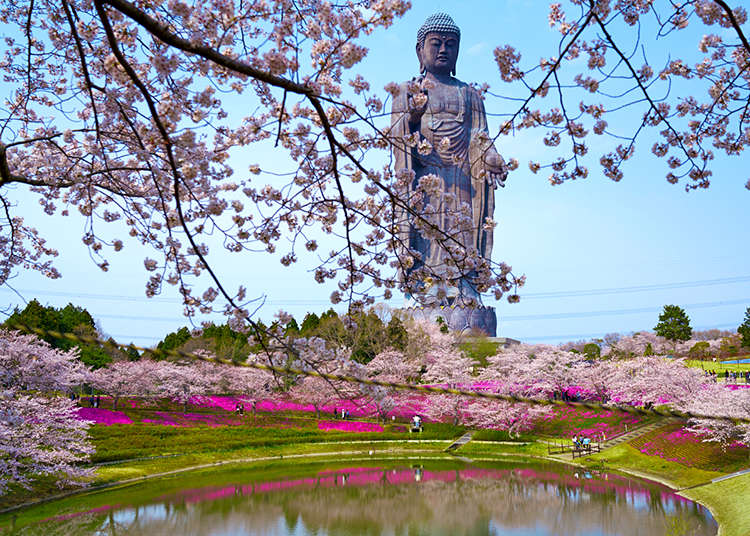
Ushiku Daibutsu Guide: Visiting The World's Tallest Buddha in Ibaraki
- Written by: Matt Vachon
The Ushiku Daibutsu in Ibaraki Prefecture is one of the tallest statues in the world draws crowds from all over the world.
In the world of Japanese architecture, attention and praise is most often given to those with the longest history; and understandably so. Buildings such as Horyu-ji; the oldest wooden structure in the world, and Kinkaku-ji; the stunning golden temple of Kyoto, are just as much works of art as they are functional spaces.
Though often overlooked by visitors and native Japanese alike, a more modern architectural marvel, the Ushiku Daibutsu in Ibaraki, is the Guinness Book world record holder for the tallest bronze Buddha statue in the world. At 120 meters high, it is three times taller than the Statue of Liberty, and ranked as the fourth tallest statue in the world.
For those wanting to add something both incredible and off the beaten path to their Japan itinerary, give the Ushiku Daibutsu a closer look.
- Table of Contents
-
- Path of the Buddha: Getting to the Ushiku Daibutsu
- Enjoy the Scenery around the Ushiku Daibutsu
- Other Attractions at the Ushiku Daibutsu
- The World of Infinite Light and Life
- The Room of Mount Grdhrakuta
- The World of the Lotus Sanctuary
- The World of Gratitude and Thankfulness
- Ushiku Daibutsu Observation Deck
- Enjoy a day at the Ushiku Daibutsu
Path of the Buddha: Getting to the Ushiku Daibutsu
For most visitors, the journey to the Daibutsu will start at nearby Ushiku Station. From the station’s east exit, an hourly bus will shuttle you to your destination for ¥680 (or ¥520 for the express bus which runs on weekends). If you happen to miss the bus or would prefer a more private ride, a taxi from the station costs roughly ¥3500.
For most of the ride to the Ushiku Daibutsu, the scenery is roughly what one would expect of a quiet, countryside area. Seemingly endless stretches of rice fields and farmland are seldom interrupted by a spattering of convenience stores and the occasional dilapidated bus stop dotting the landscape. Soon, however, the giant bronze head of the Buddha begins to peer over the distant tree line. If the staggering size of the statue is not immediately apparent, it soon will be as the sightline clears and the entirety of the colossal Buddha can be seen.
Enjoy the Scenery around the Ushiku Daibutsu
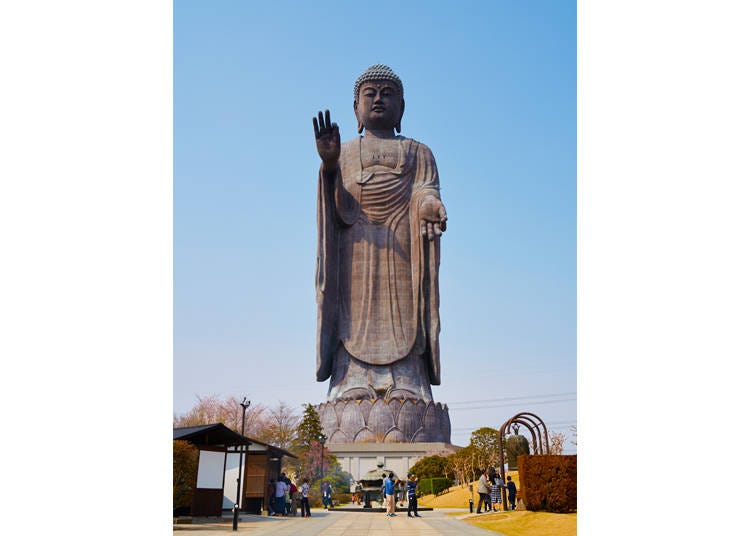
After passing through a narrow alleyway of stalls selling snacks and various miniature Daibutsu souvenirs, visitors will arrive at a ticket window. There are two options to choose from; a basic ticket which offers admission the the surrounding garden and small petting zoo for ¥500, or a combination ticket which also includes entrance to the interior of the statue for ¥800.

Once inside, one must first walk under an archway which houses a large, ornate bell. Visitors are welcome to ring the bell with an attached wooden mallet. Be warned however, it is incredibly loud up-close. Thankfully, the initial clang quickly gives way to a calming, sustained tone that can be heard throughout the garden.

Through the archway, a path extends directly ahead to the Daibutsu. While it’s hard not to be immediately drawn to the massive statue standing before you, it’s highly recommended that visitors take some time to appreciate the over two square kilometer garden which is home to the Ushiku Daibutsu.
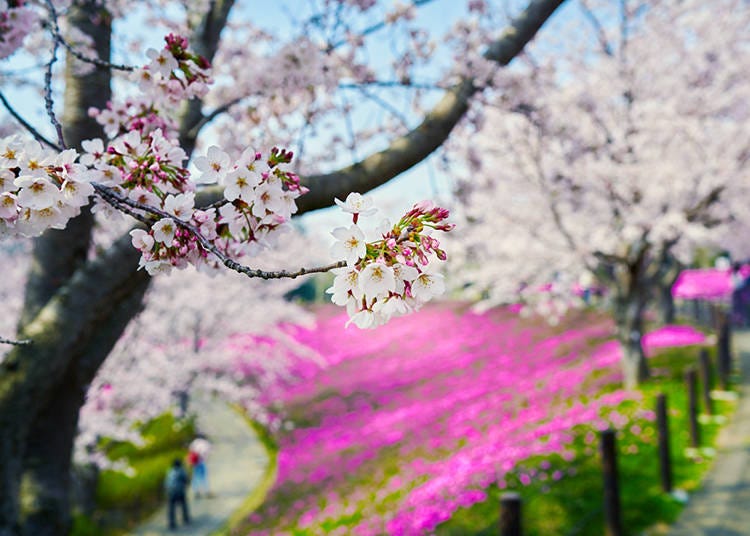
No matter what time of year it is visited, the garden is a perennial place of beauty. In early April, the garden is saturated in varying shades of pink as Japan’s famous cherry blossoms begin to bloom. Come summer, the ground is dotted with a rainbow of Icelandic poppies which visitors can pick and take home for a small fee. Later, as the weather begins to cool in early fall, fields of pink and purple cosmos can be seen throughout. Even in winter when the nearby trees have dropped their leaves, the sight of the Daibutsu standing tall over the frozen landscape is an other-wordly, yet beautiful scene.
Other Attractions at the Ushiku Daibutsu
In addition to plantlife, the garden at the Ushiku Daibutsu is home to a number of animals as well. At the base of the statue, visitors can feed massive schools of koi in a large looking pond.
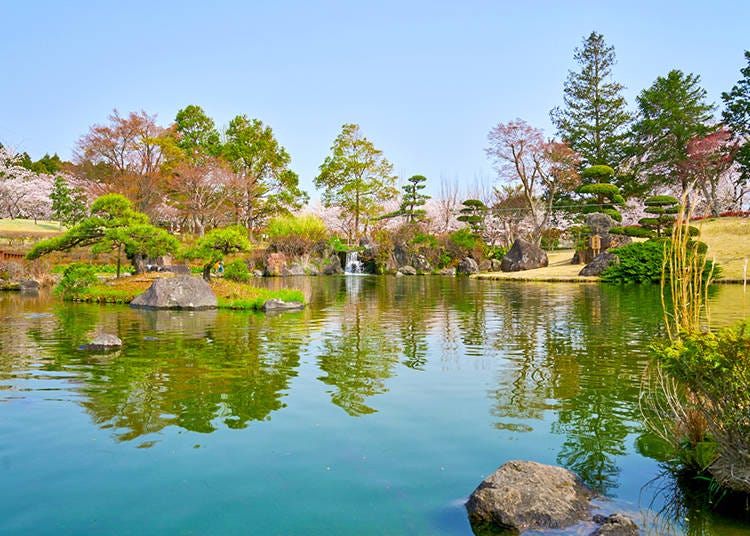
Located at the rear of the statue, the garden’s petting zoo is another popular attraction for families with young children. Here, guests can play with free-roaming rabbits and feed a variety of animals including goats, sheep, and Patagonian mara.
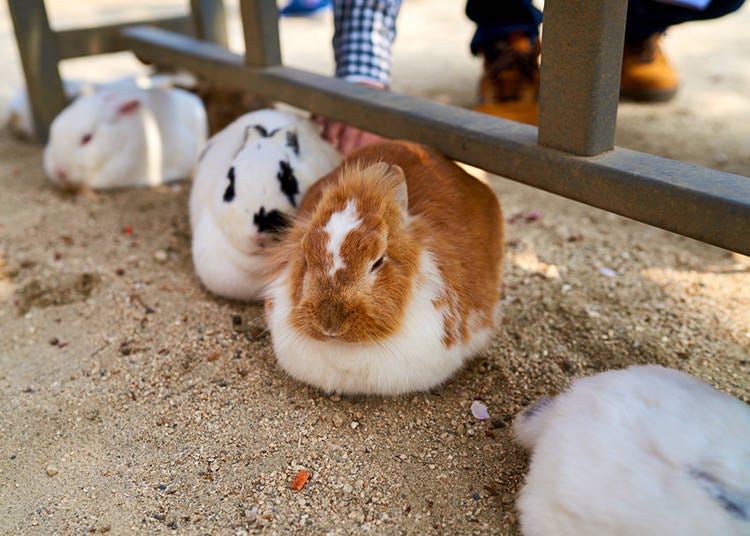
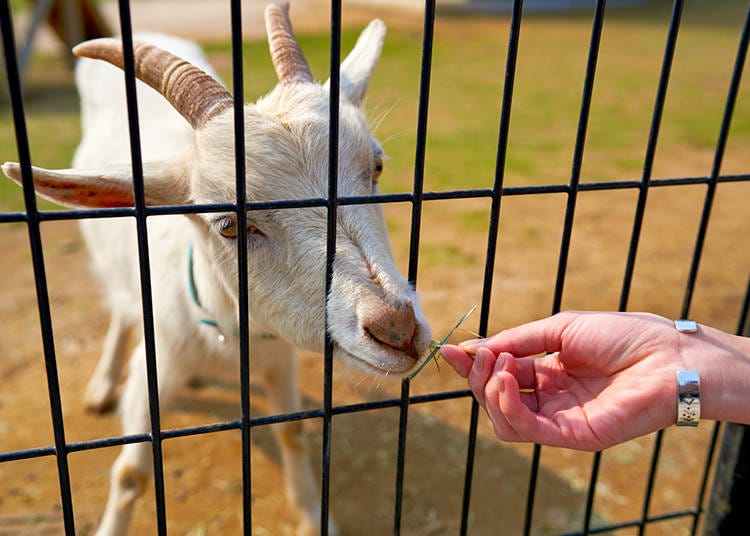
Depending on the time of your visit, you may also be lucky enough to catch a live show featuring, Mikan, an incredibly talented monkey.
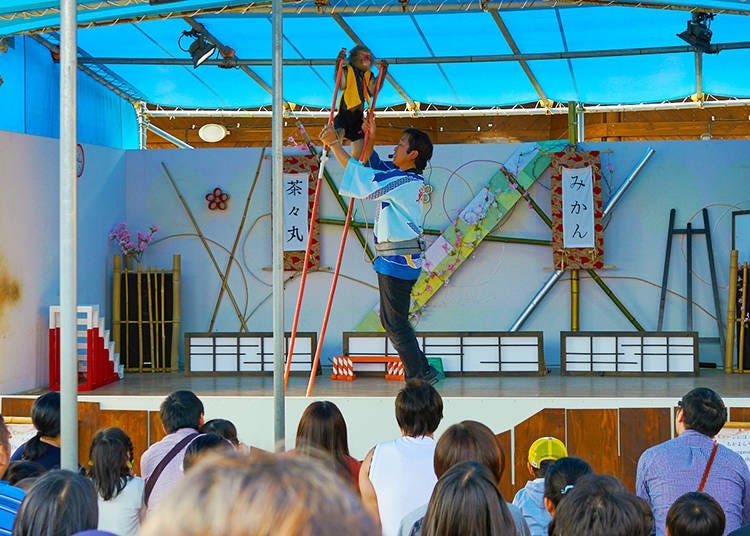
As you continue walking along the path that leads to the Daibutsu, you will soon encounter another record holder. At many Buddhist temples across Japan, large incense censers are placed so that visitors can “purify” themselves before entering the sacred space. The censer at the Ushiku Daibutsu is not only beautifully ornate, it is also the largest one in all of Japan.

Once purified by the incense smoke, you will be ready to head inside. The entrance to the Daibutsu is located at the back of the statue. As is the case with many buildings in Japan, guests are required to remove their shoes upon entering, so be sure to wear socks on the day of your visit.
The World of Infinite Light and Life
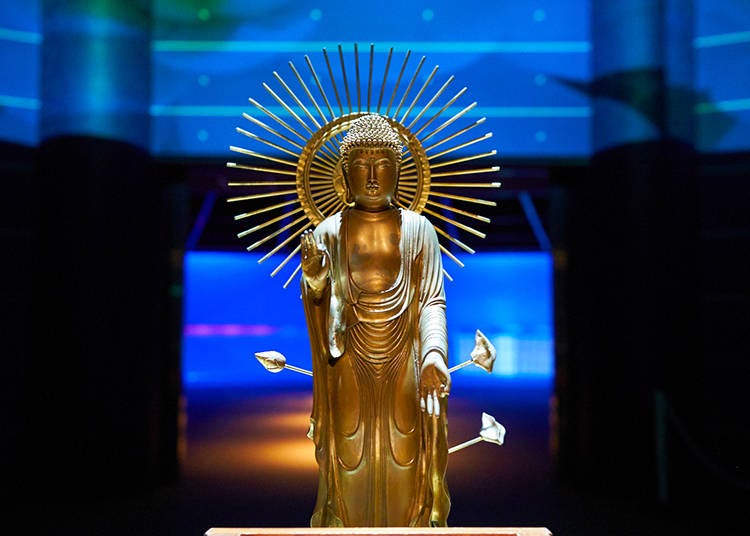
Visitors will begin their journey through the Daibutsu in a room known as the World of Infinite Light and Life. The space; dimly illuminated with lights of varying shades of blue, green and copper, features a golden Buddha statue on display. The tranquil music and calming tones of the room make it the perfect place to decompress from the outside world before continuing on your self-guided tour.
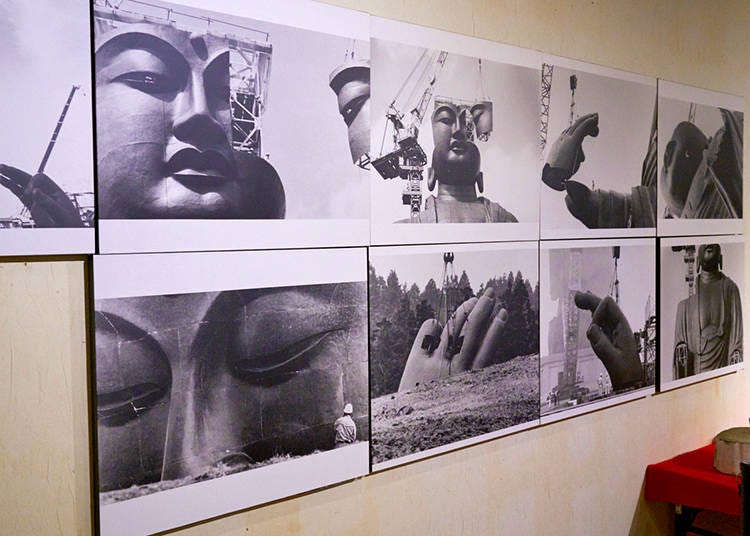
In the next room, exhibits chronicling the creation of the Daibutsu are on display. The art gallery-style black and white snapshots showcase the incredible piece by piece construction process which took place over the course of ten years before being completed in 1993.
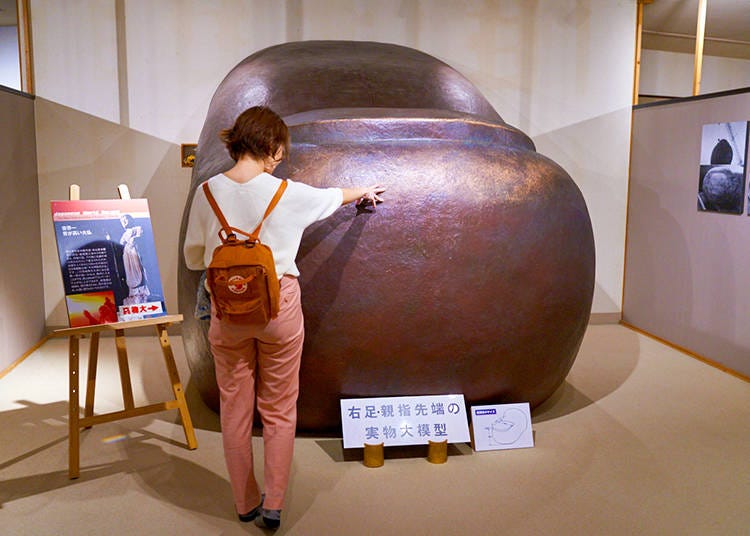
To truly appreciate the massive size of the Ushiku Daibutsu, the exhibit also houses a replica of one of the statue’s toes.
The Room of Mount Grdhrakuta
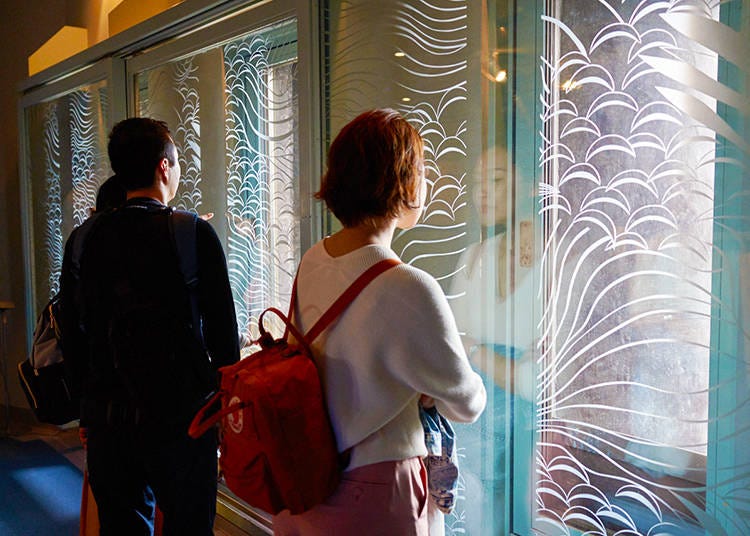
The next stop on the tour takes visitors to the fifth floor of the statue, known as The Room of Mount Grdhrakuta. The mountain in India from which is takes its name was said to have been one of the Buddha’s favorite retreats. Here, a wealth of information about the life of the Buddha, as well as a small relic of the Buddha encased in a golden box is on display. Perhaps the biggest draw however, are the viewing windows located in all four directions. From this chest-high vantage point, 85 meters high in the statue, sights as distant as Tokyo Tower or Mount Fuji can be seen on clear days.
The World of the Lotus Sanctuary
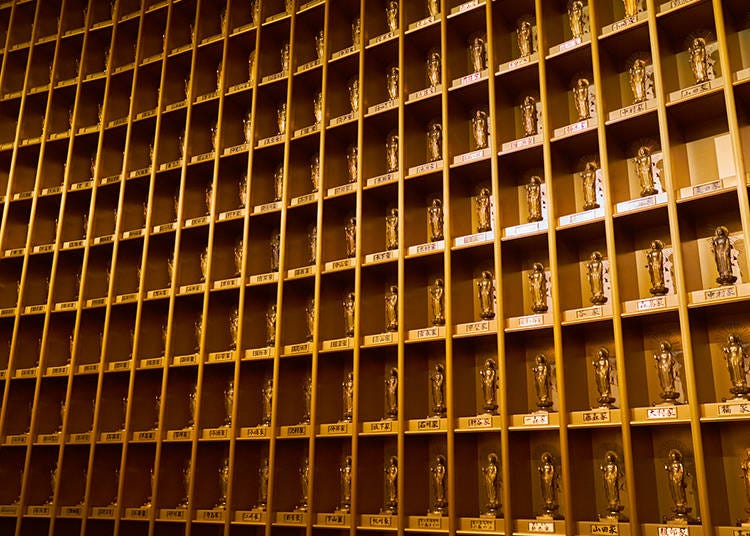
After taking in the views, take the spiral staircase in the center of the room down one floor to the statue’s gift shop before entering an elevator to the Daibutsu’s third floor; the World of the Lotus Sanctuary. Upon exiting the elevator, you will find yourself in a dazzling, rounded corridor with walls lined from floor to ceiling with golden Buddha effigies.
In total, just under 3,400 golden Buddhas are on display throughout the room. Look a bit closer and you will find that many have writing on their corresponding plaques. Each statue with a name attached has been purchased by a family in remembrance of a family member who has passed away. Throughout the day, it’s also possible to witness a monk reciting Buddhist prayers as a memorial service in their honor.
The World of Gratitude and Thankfulness
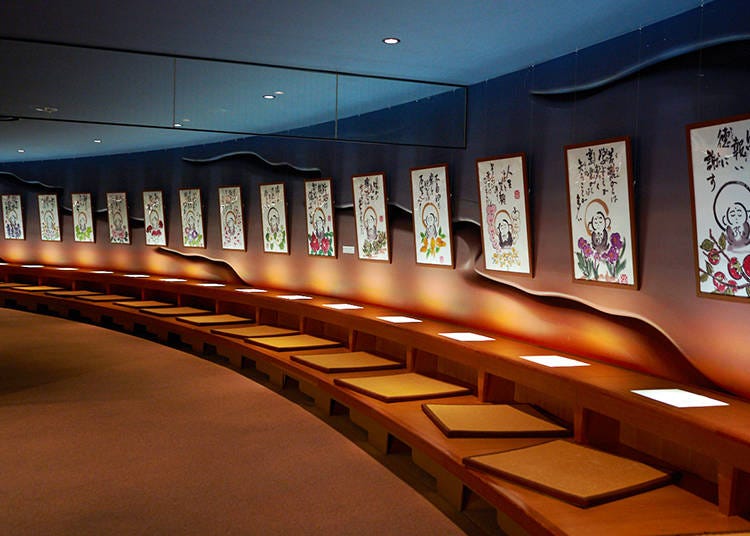
The second and final floor on your tour of the Ushiku Daibutsu is the World of Gratitude and Thankfulness. In this tranquil space reminiscent of the World of Infinite Light and Light, visitors can try their hand at writing sutra (Buddhist scripture) using a fude; a tradition Japanese brush used for writing kanji. Thankfully, this is done on tracing paper over a pre-written sutra, so it can be enjoyed by visitors of all ages and skill levels. For ¥200, you can choose from several different sutra and borrow a fude and ink set.
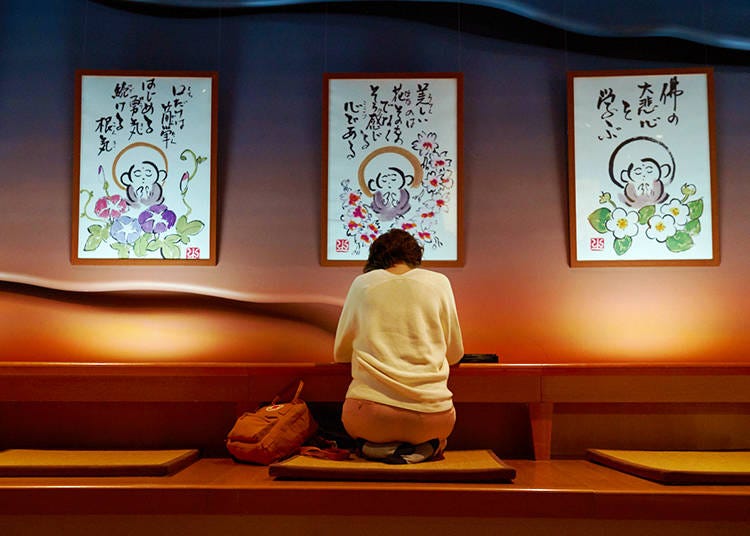

Ushiku Daibutsu Observation Deck
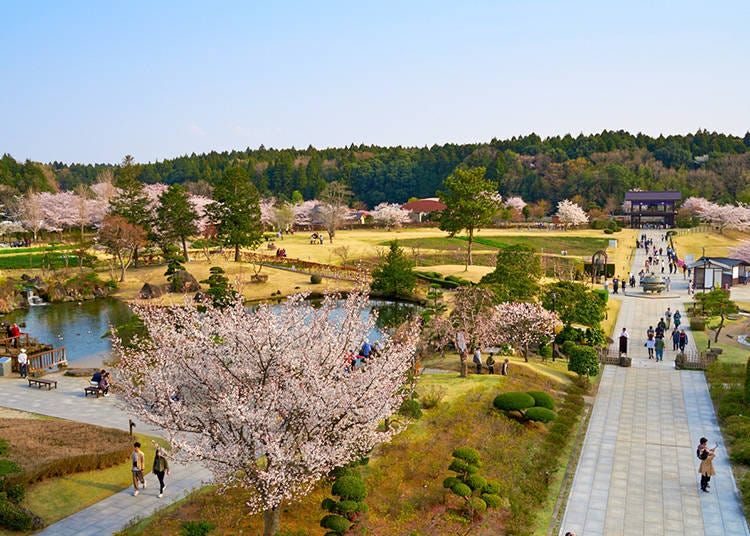
Before leaving the statue, enjoy one last view from the observation deck located at the end of the hallway on the second floor. From the top of the statue’s twenty meter-high lotus platform, the panoramic views of the surrounding garden is the perfect photo opportunity to conclude your day at the Ushiku Daibutsu.
Enjoy a day at the Ushiku Daibutsu
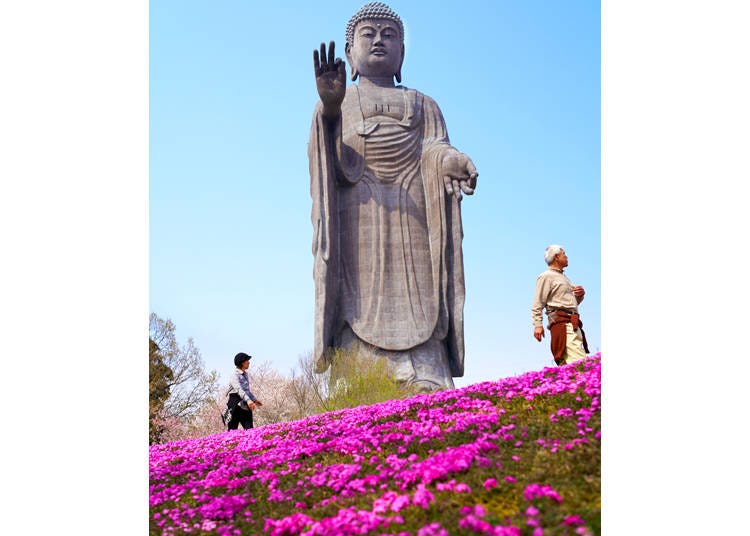
For those looking for something extraordinary outside of the crowded, mainstream tourist spots, the Ushiku Daibutsu could be just that. At just an hour and a half north of central Tokyo, it’s the perfect addition to any Japan itinerary.
-
Ushiku Daibutsu牛久大仏
- Address Kunomachi 2083, Ushiku, Ibaraki 300-1288
-
Nearest Station
Ushiku Station
- Phone Number 029-889-2931
Hours
Monday - Friday 9:30 AM - 5:00 PM
Saturday - Sunday 9:30 AM - 5:30 PM
Access
From Ushiku Station, the following buses are available:
Weekdays - 9:00, 10:05, 11:05, 13:05, 14:05
Weekend (Standard bus) - 9:05, 11:20, 12:50, 13:45, 15:15
Weekend (Express bus) - 9:00, 10:00, 11:00, 12:00, 13:40, 14:30, 15:40, 16:40
Matt Vachon is a content creator in Tokyo who enjoys exploring off the beaten path locations around Japan. Graduated from the University of Massachusetts before moving to Japan. Since that time, he has created content for numerous tourism focused publications including The Japan National Tourism Organization, Tsunagu Japan, and Tokyo Localized. Holds a bachelor's degree in psychology. He is passionate about filmmaking and has been working on documentaries about Japan. During his downtime, he's often indulging his inner foodie by trying out some of the best hidden gem restaurants in Tokyo.
- Area
- Category
*Prices and options mentioned are subject to change.
*Unless stated otherwise, all prices include tax.
Popular Tours & Activitiess
Recommended places for you
-
Ad

The Latest Guide to "Tourism Mobility": Traveling Japan More Freely. What exactly are Japan’s version of ride-sharing and transit deserts?
-

Farewell, Heavy Suitcases! Keisei Ueno’s New Service Makes Your Last Day in Tokyo Totally Hands-Free
by: Guest Contributor
-
Ad

What Makes Japanese Yakiniku So Darn Good? Guide to Cuts, Heat, and Wagyu Know-How
-
Ad

5 Recommended Wagyu Yakiniku Restaurants in Tokyo: Signature Dishes, Premium Beef, and Secret Sauces
-

To the Holy Land of Kawaii! Odakyu Tama Center Station Is Becoming a Dreamy Sanrio Wonderland
by: Guest Contributor
-
Ad

The Whisper of a 1,300-Year-Old History: Meet the Other Face of Nara at Night
by: Shingo Teraoka
-

Ultimate Tokyo Transit Guide: JR, Subways, and Private Railways Explained, Plus Suica/PASMO and Money-Saving Passes
-

Hachiko: The Legend of Japan’s Most Faithful Dog
-

Tokyo Tsukiji|Tsukiji Area Map & Sightseeing Information
-

10 Steps to Become an Expert on Tokyo Station
-

Tokyo Roppongi|Roppongi Station Area Map & Sightseeing Information
-

Incredible Views of Tokyo: Inside Tokyo Tower's Top Deck Tour
- #best ramen tokyo
- #what to buy in ameyoko
- #what to bring to japan
- #new years in tokyo
- #best izakaya shinjuku
- #things to do tokyo
- #japanese nail trends
- #what to do in odaiba
- #onsen tattoo friendly tokyo
- #daiso
- #best sushi ginza
- #japanese convenience store snacks
- #best yakiniku shibuya
- #japanese fashion culture
- #best japanese soft drinks




















